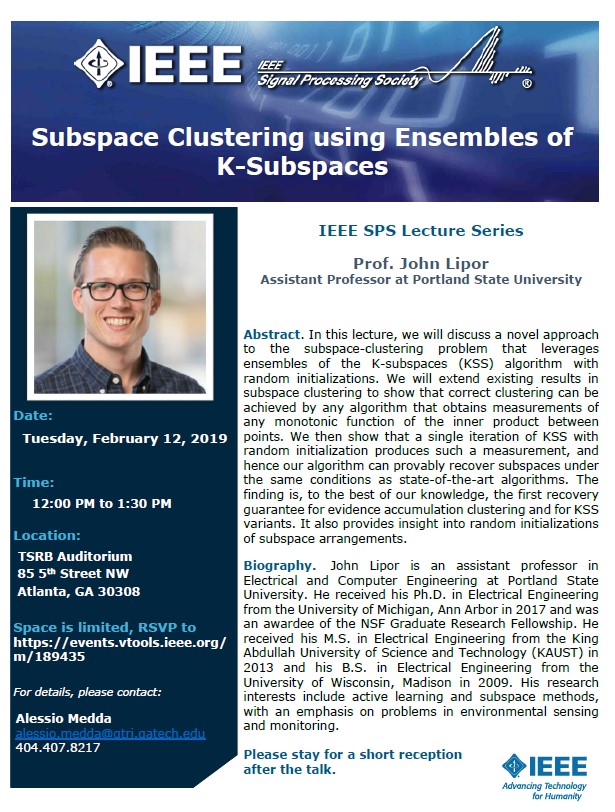Subspace Clustering using Ensembles of K-Subspaces

The Atlanta Signal Processing Chapter is honored to host Prof. John Lipor from Portland State University
Professor Lipor will present a lecture on the topic of subspace clustering. Prof. Lipor is an Assistant Professor at Portland State University in the Electrical and Computer Engineering department. His research focuses on the design and analysis of machine learning and signal processing algorithms, with applications in environmental sensing and monitoring.
For a list of publications, check out his Google Scholar Profile.
Parking. Best parrking option is to use the Centergy Parking garage accessible from Spring Street. Optionally, you can park at the Georgia Tech Hotel guest parking or in any metered spot on Tech Square
Chapter Facebook page: https://www.facebook.com/IEEESPSATL/
Date and Time
Location
Hosts
Registration
-
 Add Event to Calendar
Add Event to Calendar
- 85 5th Street NW
- Atlanta, Georgia
- United States 30308
- Building: Technology Square Research Building (TSRB)
- Room Number: Auditorium
Speakers
John Lipor
Subspace Clustering using Ensembles of K-Subspaces
We discuss a novel approach to the subspace clustering problem that leverages ensembles of the K-subspaces (KSS) algorithm with random initializations. We extend existing results in subspace clustering to show that correct clustering can be achieved by any algorithm that obtains (possibly perturbed) measurements of any monotonic function of the inner product between points -- so it is possible to cluster with missing data, compressed data, or in other scenarios where only an approximation of inner products is available. We then show that a single iteration of KSS with random initialization produces such a measurement, and hence our algorithm can provably recover subspaces under the same conditions as state-of-the-art algorithms. The finding is, to the best of our knowledge, the first recovery guarantee for evidence accumulation clustering and for KSS variants. It also provides insight into random initializations of subspace arrangements. We show on synthetic data that our method performs well in the traditionally challenging settings of subspaces with large intersection, subspaces with small principal angles, and noisy data. Finally, we show our algorithm achieves state-of-the-art performance across several benchmark datasets, including a resulting error for the COIL-20 database that is less than half that achieved by existing algorithms.
Biography:
John Lipor is an assistant professor in Electrical and Computer Engineering at Portland State University. He received his Ph.D. in Electrical Engineering from the University of Michigan, Ann Arbor in 2017 and was an awardee of the NSF Graduate Research Fellowship. He received his M.S. in Electrical Engineering from the King Abdullah University of Science and Technology (KAUST) in 2013 and his B.S. in Electrical Engineering from the University of Wisconsin, Madison in 2009. His research interests include active learning and subspace methods, with an emphasis on problems in environmental sensing and monitoring
Address:United States
Agenda
12:00 PM - 12:05 PM - Introductions
12:05 PM - 12:45 PM - Seminar by Prof. John Lipor
12:45 PM - 1:00 PM - Discussion and Q&A
1:00 PM - 1:30 PM - Reception and networking

